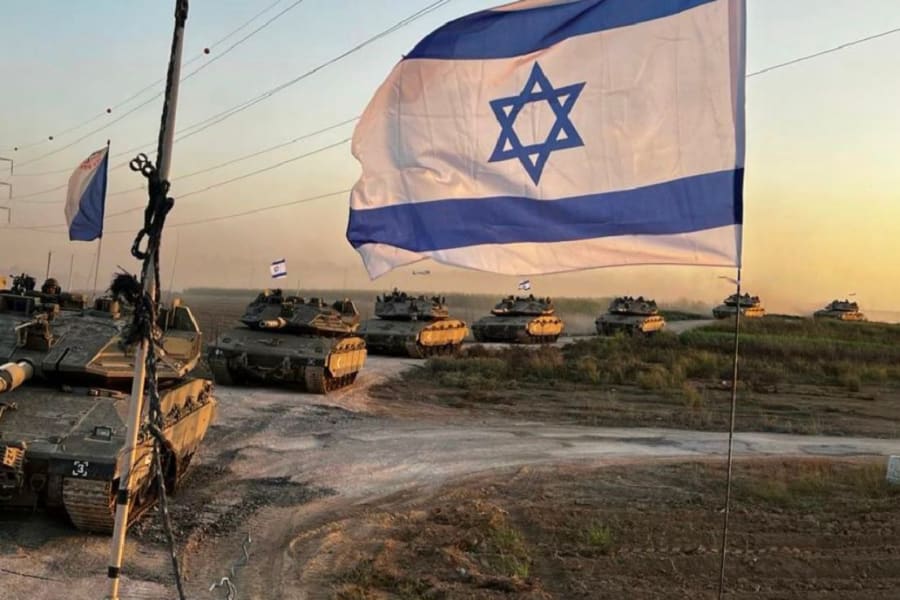Israel weighs new Gaza ‘siege plans’ as attempts to resurrect ceasefire talks continue
Israeli media: Netanyahu considers partial Gaza annexation as tool to pressure Hamas

Israel’s leadership is considering how to proceed in the Gaza Strip, as the mediators continue attempts to revive the ceasefire talks with Hamas despite Israel and the U.S. having withdrawn their teams from Qatar following unacceptable demands by the terror group.
Prime Minister Benjamin Netanyahu approved a significant expansion of humanitarian aid deliveries to Gaza this week, which could lower the international pressure on Israel but also allows Hamas to refresh its supplies.
However, during a cabinet meeting on Monday evening, the political leadership discussed several possible next steps, including some that would dramatically raise the pressure on the terror group.
The Israel Defense Forces (IDF) presented a new “siege plan” for the Gaza Strip that would cut off all humanitarian aid and electricity, according to Kan News.
According to the newspaper Maariv, Netanyahu is even mulling the annexation of parts of the enclave if Hamas continues to reject a negotiated agreement, while Channel 12 reported that a full military occupation of Gaza is also on the table.
The “siege plan” would include another significant expansion of ground operations, and this comes shortly after the IDF reduced its troop numbers in Gaza in anticipation of a ceasefire.
The possible annexation of parts of Gaza was only presented to a small group of ministers, according to Maariv, who also decided on the creation of a new agency to administer the annexed areas.
The Israeli government has threatened to carry out such a step several times but never declared it to be official policy.
In addition to the report by Maariv, Haaretz also reported that annexation is being weighed, while adding that the plan is part of Netanyahu’s effort to sway Finance Minister Bezalel Smotrich against leaving the government with his Religious Zionism party.
Combined with the fact that the “plan” was discussed among ministers but not with the military, it could imply that this is more of an abstract idea meant to give Smotrich a plausible reason to stay in the government.
Haaretz also reported that Smotrich already signaled he would “remain in the government for the time being” if the plan was advanced, and that it had been given a green light from the White House.
A source quoted by Kan News said that Israel is at “the worst situation at the current point in time.”
“The negotiations for a [ceasefire and hostage release] deal are at a standstill, the IDF is in a kind of shambles in the Strip and soldiers are being killed, and Hamas is not feeling the pressure,” he said.
“Not to mention Trump’s words today confirming that [in his understanding] there is famine in Gaza.”
Meanwhile, Strategic Affairs Minister Ron Dermer and National Security Adviser Tzachi Hanegbi reportedly traveled to Florida to coordinate the next steps on the Gaza situation with White House special envoy Steve Witkoff on Monday, an informed source told the Times of Israel.
Israel wants the U.S. to increase pressure on Qatar to push Hamas to an agreement, a senior military source told Channel 12: “The US needs to put a gun on the table and force Qatar to choose between Hamas’s interests and its own. The US is the only actor that can bring Hamas back to the negotiating table. If it doesn’t act, the situation will remain unchanged.”
Sources from Egypt and Qatar, the main mediators between Israel and Hamas for the duration of the war, have been telling several news outlets that the gaps in the talks were still bridgeable and urged the sides to return to the negotiating table.
However, sources quoted by Ynet News noted that Hamas’ conduct has truly angered the mediators this time.
Khalil al-Hayya, senior Hamas official and head of the group’s negotiating team, hinted as much when he criticized the Arab nations in a speech this week saying, “It’s time for our (Islamic) nation to break the siege on Gaza and deliver food, water, and medicine to your brothers and your people,” he said.
“We call on our Arab and Islamic nations – especially those bordering Palestine – to march toward Palestine by land and sea, to lay siege to embassies and to fully enforce the economic and tourist boycott,” al-Hayya added in comments that appear particularly targeted at Egypt.
Nevertheless, Israel has reportedly not abandoned the negotiations completely, holding out hope that even a limited hostage deal might be possible.
“The response, as mentioned, was not good, but the gaps are really small. It’s purely a matter of decisions,” one source familiar with the negotiations told Ynet News.
“Bibi definitely wants a deal, and there’s no Plan B. But he can’t keep a big delegation there for two more weeks doing nothing when Hamas isn’t really budging. So he made a show of strength and pulled them back,” he explained.
“The talks aren’t really collapsing – in the end, both sides want a deal. It’s just a decision that can be made and executed. But meanwhile, another day passes, and another, and the hostages continue to suffer and remain in danger.”

The All Israel News Staff is a team of journalists in Israel.
You might also like to read this:














